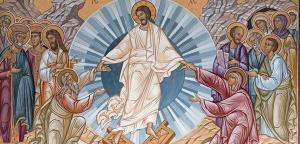What Is a “Resurrection Body?”
We are not a week away (past) Easter Sunday. And I am musing (not pontificating) about the meaning of “resurrection body.” Christian belief that the tomb of Christ was empty, emptied by God, and that Christ’s body was changed, not left to rot or merely resuscitated, calls for explanation. However, all Christians admit it is a mystery to our minds, incapable of complete explanation.
Might it be the case that part of our perplexity about the resurrection, ours and Christ’s, is rooted in modern materialism?
Even in the first century, people knew what happened to dead bodies, to corpses. They begin to decay immediately after death. Long after death, they all but disappear due to decay. Some are eaten by animals. Some burn up. But even those that don’t suffer those fates simply decay and eventually turn into dust.
So, our minds ask, and some ask out loud, how can even God raise decayed bodies from death?
We have very little to go on here except Jesus’s resurrection appearances and the Apostle Paul’s teachings about our resurrections in 1 Corinthians 15. Jesus’s raised body was glorified, changed, transformed to a new form of life fit for heaven. So will ours be. But what does that mean? What kind of “body” is raised?
Might it be the case that we struggle with this because our minds are tied to material “reality?” What if matter is not ultimate? What if “spirit” is more real than matter?
The tomb of Jesus was empty; his body left the tomb but in a radically transformed state that was capable of many things matter, as we typically think of it, is not. Was his resurrection physical?
The Apostle Paul linked Jesus’s resurrection and ours very closely. His resurrection was the first fruits of the general resurrection of all the dead in the eschaton. We shall be like him in our resurrection, Paul writes.
Paul described Jesus’s raised body and ours as “soma pneumatikos.” Translated into English that is “spiritual body,” not “physical body.”
The question I have been asked numerous times is “How will God ‘raise’ bodies that have totally decayed? What about those bodies that no longer exist due to being destroyed in some manner?” And “What about cremated bodies?”
These are valid questions. But do they assume that resurrection bodies are, in some sense, physical, some form of matter? What if “matter” is an illusion—at least as we normally think of it? What if spirit is more real than matter? Might it not be the case that God doesn’t gather all the atoms and molecules of every deceased person, bind them together again, and … ? What if a spiritual body is a new entity, a new reality, a new creation even though somehow continuous with the physical body? The “continuity” being of God’s new creation by the power of the Spirit “remembering,” as it were, the physical body?
I speak here only of those bodies that cannot be “raised” in the way Jesus’s body was brought out of the tomb. And that because they are simply gone. There is nothing to “raise.” But, in both cases, I muse, the fundamental reality of the new body is spirit, not matter. Both are events of God’s memory at work.
*Note: If you choose to comment, make sure your comment is relatively brief (no more than 100 words), on topic, addressed to me, civil and respectful (not hostile or argumentative), and devoid of pictures or links.*














